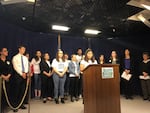Oregon lawmakers meeting in Salem on Monday were met by a phalanx of climate advocates, bent on forcing action in 2020 on a policy to regulate the state’s greenhouse gas emissions.
Volunteers with the group Renew Oregon stalked the hallways outside legislative offices, seeking in-person assurances that the Legislature will once again take up a policy to meaningfully chop those emissions over the next three decades.
At the same time, the advocates emphasized a point that could have more sway than face-to-face meetings: If lawmakers once again fail to act, environmentalists have other options.
“Large polluters and their allies should be clear on one thing,” said Tera Hurst, Renew Oregon’s executive director. “Climate action is coming one way or another in 2020, and Oregonians are hungry for it.”

Activists and climate scientists unite in the Oregon Capitol on Nov. 18, 2019, to urge lawmakers to regulate greenhouse gas emissions.
Dirk VanderHart / OPB
The lobbying push comes as lawmakers are working to revamp a bill that died in the 2019 legislative session. That proposal, House Bill 2020, would have set a cap on carbon dioxide emissions from the transportation, energy and manufacturing sectors, and reduced allowable emissions over time. It also would have charged polluters for at least a portion of their greenhouse gas output by forcing them to purchase credits at auction.
Democratic leaders have been clear that they will take up a similar proposal in next year's monthlong legislative session, scheduled for February. While meeting in Salem for routine committee hearings this week, lawmakers are expected to hash out what that proposal might look like. Ideas that have been floated so far include concessions to HB 2020's opponents — something that might be necessary to keep Republicans from once again fleeing the Capitol.
At a press conference attended by young activists and climate scientists from Oregon State University, Hurst referenced three proposed ballot measures her coalition has put forward. If passed by voters in 2020, the proposals would require the state to phase out electricity sources that contribute to global warming, and transition to a carbon-free economy by 2050.
“They’re going to hate our ballot measures, because they contain even more protections,” Hurst said of opponents to the cap-and-trade proposal.
Renew Oregon is also calling on Gov. Kate Brown to commit to using her authority as the state's top elected official to implement new regulations if a climate bill does fail again. In July, Brown threatened to sign an executive order implementing such policies if no progress was made.
In particular, Renew and its allies say Brown should prepare to make the state's existing greenhouse gas reduction goals more stringent, and to add teeth requiring that industries do their share. The state is currently not on target to meet its goals.
The group also wants Brown to strengthen the state's Clean Fuels Program, requiring steeper reductions to the carbon intensity of gasoline in Oregon than currently mandated.
“Governor Brown, you have significant power to keep your promise to the kids of Oregon and to take bold action,” Hurst said. “We’re asking you to commit to take these steps the day the Legislature adjourns” if a climate change bill is not passed.
The governor’s office has said Brown is still considering an executive order, but she has not offered specifics on what one might look like.
More than any particular policy, the Monday press event emphasized the urgency that climate scientists say will be necessary in order to avoid irreversible impacts in the future.
“We have reached a time where global and local collaboration to reduce greenhouse gas emissions is essential if we want a decent future for the next generations,” said Dominique Bachelet, a professor of environmental science at Oregon State University, who has studied the impacts of climate change for three decades. “Oregon must play its part. Every ton of greenhouse gas we avoid releasing into our shared atmosphere matters.”
The sentiment was echoed by Beverly Law, another OSU professor who researches the impact of climate change on forests, and how forests absorb carbon dioxide emissions.
“We don’t have time to waste,” Law said. “We need lawmakers to unite behind the science.”
